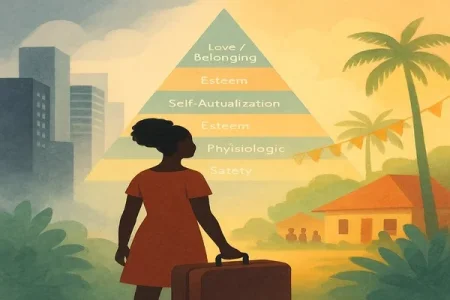
Many middle‑class Nigerians who chased higher salaries overseas discover that, once basic needs are met, systemic racism, social exclusion, and unmet emotional needs drive a powerful longing to return home. Drawing on Maslow’s hierarchy—and echoing Ifemelu’s journey in Chimamanda Ngozi Adichie’s Americanah—they realise that safety, belonging, and esteem often remain out of reach abroad, turning the dream of “a better life” into a reason to come back.
What needs beyond income most influence migrants’ decisions to return?
How do experiences of race and privilege abroad reshape one’s desire for homecoming?
- Hierarchy Reordered: Having met physiological and safety needs overseas, middle‑class Nigerians still crave love, belonging, and esteem—needs often fulfilled more readily in Nigeria’s communal societies.
- Race and Otherness: As Ifemelu blogs about in Americanah, Nigerians abroad confront a sudden racial lens: hair politics, accent jokes, and microaggressions that chip away at self‑worth.
- “Back of the Queue” Syndrome: Accustomed to elite circles in Lagos, returnees feel relegated, waiting for invitations, promotion, or social access they once took for granted.
- Mindset vs. Material Gain: The conviction “I deserve better” intensifies disappointment when doors don’t open abroad, making even a high-paying job feel hollow without respect.
- Pull of Home: Familiar cultural cues, shared histories, and automatic inclusion offer the esteem and community that money overseas can’t replicate—turning the idea of return from “fallback” into “reclamation.”
After six years in the U.K., a Nigerian‑trained architect earned twice her Lagos salary—but faced silence at office gatherings and bias in client meetings. Like Ifemelu returning to Nigeria in Americanah, she chose homecoming over another pay raise, drawn back by impromptu street festivals, family cook‑outs, and the unspoken affirmation of “you belong.”
At Home: How can Nigerian towns and cities better harness returning talent, through coworking hubs, cultural festivals, and alumni networks, to sustain that sense of esteem?
Abroad: What concrete steps (mentorship, affinity groups, anti‑bias training) should institutions adopt so middle‑class migrants feel genuinely included, not just economically accommodated?




